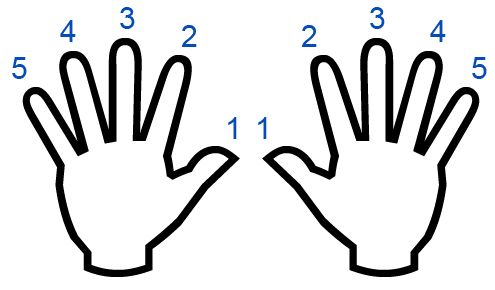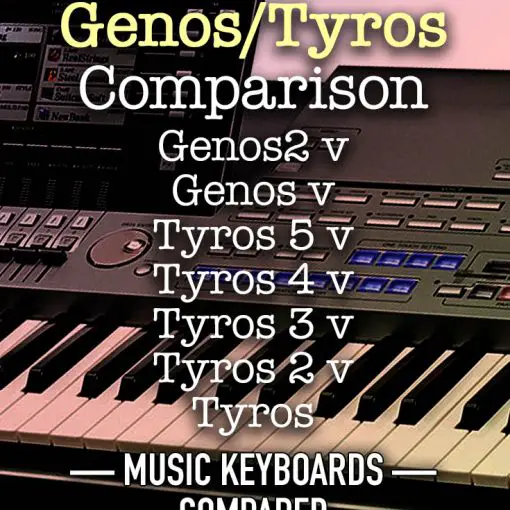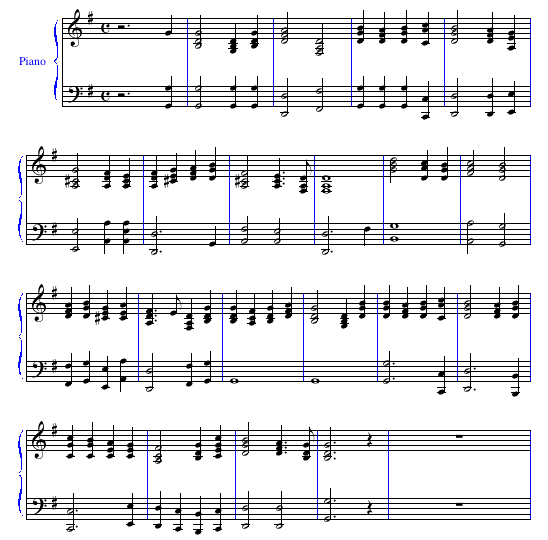Structure
A one octave D harmonic minor scale is made up from the eight notes D, E, F, G, A, Bb, C# and D. This can be extended across the keyboard as required for two, three or four octave scales.
Here are the notes of one octave depicted on a piano keyboard diagram.
Fingering
Number the fingers on both left and right hands as follows:
- Thumb: 1
- Index: 2
- Middle: 3
- Ring: 4
- Little: 5
Here’s a diagram of how to number the fingers:
Right Hand Playing
The ascending one octave D harmonic minor scale is most easily played by the right hand with the fingering 1, 2, 3, 1, 2, 3, 4, 5.
Should you wish to play more than one octave, replace the ‘5’ with a ‘1’, continuing the sequence from the start, thus: 1, 2, 3, 1, 2, 3, 4, 1, 2, 3, 1, 2, 3, 4, 1…
To play the descending one octave D harmonic minor scale, reverse the sequence thus: 5, 4, 3, 2, 1, 3, 2, 1.
Should you be playing more than one octave, repeat the sequence from finger ‘4’, thus: 5, 4, 3, 2, 1, 3, 2, 1, 4, 3, 2, 1, 3, 2, 1, 4, 3…
Left Hand Playing
The ascending one octave D harmonic minor scale is most easily played by the left hand with the fingering 5, 4, 3, 2, 1, 3, 2, 1.
Should you wish to play more than one octave, repeat the sequence from finger ‘4’, thus: 5, 4, 3, 2, 1, 3, 2, 1, 4, 3, 2, 1, 3, 2, 1, 4, 3…
To play the descending one octave D harmonic minor scale, reverse the sequence thus: 1, 2, 3, 1, 2, 3, 4, 5.
Should you be playing more than one octave, replace the ‘5’ with a ‘1’, continuing the sequence from the start, thus: 1, 2, 3, 1, 2, 3, 4, 1, 2, 3, 1, 2, 3, 4, 1…
Playing Both Hands Together
Once you’ve practiced both hands separately, it’s time to play the two hands simultaneously. There’s no particular trick to this — it just takes time to get used to it.
Scales are generally played with the hands one octave — that is, eight white notes — apart.
Start slowly, concentrating on fingering and playing each pair of notes at the same time, and gradually build up the speed. Ensure the scale maintains a regular rhythm.
Accenting
Sometimes scales are played with a slight accent on every fourth note. This works well for two and four octave scales.
Music Score
Here is the music score for two octaves of the D harmonic minor scale, with the right hand starting on the D two below Middle C and the left hand starting on the D an octave below that. The audio is available beneath the score. Note that some browsers including the desktop version of Safari will not play this, so please see the MP3 audio below. If you are playing on a mobile device, you may need to ensure the ringer is set to on.
Audio
The following is a four octave D harmonic minor scale played both ascending and descending.





